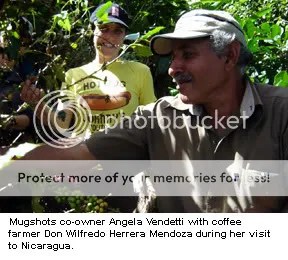The following reflection comes from Susan Sklar, Interfaith Program Manager
Picture this: a tree full of a dozen chickens and roosters in branches laden with oranges against a brilliant star lit sky. This tree stood in the barnyard of a farm where a group of five women from the Presbyterian Church (USA) and Equal Exchange delegation spent two nights this past January. It was one of our first sights at Luis and Elsa Castillo’s farm in Boaco, Nicaragua; and for me it’s an image that captures the beauty and tranquility that we found there.
The five of us were part of a fifteen member delegation to Nicaragua, visiting a primary co-operative called El Tesoro in Boaco. We had just made our way in the dark up the mountain using flashlights to avoid stumbling over rocks and tree roots. To our intermittent question, “ Donde esta tu casa, senor?” (Where is your house, sir?) Luis Castillo, answered repeatedly, “ Muy muy cerca.” (Very very close) something we soon stopped believing. The trip up the mountain was an adventure that lasted over an hour.

The five delegation members who made the climb: Melanie Hardison, PC(USA), Susan Sklar EE, Cari Senefsky EE, Kate Hopta from OH, and Cindy Shepherd from IL
When we finally reached the top of the mountain– both exhausted and relieved– the farm was inspiring. The excited Castillo family welcomed us with open arms. Elsa fixed us generous plates of tortillas, chicken stew, rice, and cheese which she had cooked over a wood fire stove. There was no running water or refrigeration; the kitchen had a dirt floor; there were only a few electrical lights; but it felt like home. That night the five of us accepted accommodations in the family’s small bedroom while they found spots for themselves in other parts of the house. (more…)





 “Leading a business with your ideals? You must be crazy.”
“Leading a business with your ideals? You must be crazy.”

